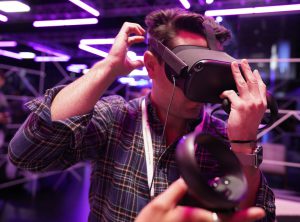
Companies have customarily responded to bias and all kinds of discrimination with unconscious bias training, which usually involves PowerPoint presentations or click-through courses to be checked off by employees. Some companies go further by organizing a Zoom session with experts on diversity and inclusion.
With this in mind, the curriculum development startup Praxis Labs launched Pivotal Experiences, a VR-based tool with the aim of taking diversity and inclusion training to the next level. The platform allows employees experience a simulation of bias and discrimination in the workplace and teaches them the best response to it.
Users are to speak aloud to the other avatars and ponder on what happened for the experience to be more impactful.
‘By providing perspective-taking and immersive experiences that build empathy, we’re helping to build understanding’, said Elise Smith, co-founder and Chief Executive of Praxis Labs. ‘By providing opportunities to practise interventions, we’re helping to change how people actually act in the workplace.’
Just last month, the firm raised $3.2 million in seed funding from backers, one of which includes Softbank’s SB Opportunity Fund. Some of the company’s early test partners include Uber, Amazon, Google and eBay. The firm is currently hiring to expand the platform to other partners.
This platform comes at a strategic time U.S. companies as the pandemic has highlighted the gaps across the labour force.
‘If the last 12 months have shown us anything, it has brought to light what has been around for a very long time’, said Kavitha Mariappan, an executive for diversity efforts for Zscaler, a cloud security platform. ‘There’s a certain level of corporate urgency around having to act on diversity and inclusion rather than just being aware.’
The software works on computers and smartphones, but the main experience occurs in virtual reality, where employees are allocated an avatar facing a specific issue at work every months.
The digital scenarios is reflecting of gathered insights and experiences from employees from a wide range of backgrounds. It could be someone facing ageism, racism or some other form of discrimination at work. The avatar might also be a bystander watching a target of unfair treatment, giving them a chance to practice being an ally or friend in need.
The avatars were designed to be representative of the global workforce.
Looking into a mirror in the virtual space, a different person’s image may be reflected back at you. They could be a different gender, race or body size. They may be a high or low ranking employee.
Users are required to respond out loud in the characters of their avatar ‘to get as close as you can to experiencing the perspective of someone else’, Smith said. The service is subscription-based. Companies are signing on for six-months to a yearlong service.
Although no amount of training can change the behaviour of everyone, data suggests that virtual reality experiences leave a long lasting impression on people and can alter their perceptions.
Researchers from the University of Barcelona found that men who committed domestic violence showed signs of emotional empathy after putting themselves in the victim’s virtual shoes.
‘By putting people on the scene, at a real situation, these invisible situations suddenly become visible’, said Nonny de la Peña, a pioneer in empathy VR and founder of Emblematic Group.
Praxis Labs’ strategy is to create a feedback loop. The software asked the employee on their possible reactions to certain situations and then offers suggestions on how best to deal with the scenario. Cumulated insights are shared with the employer, while individualized data is shared with the trainee who may continue to learn over time.
‘Even if we see someone is experiencing bias or discrimination or there’s something truly inequitable happening, it’s really hard to speak up. And the only way to change that is by building that muscle’, said Smith.
Lack of inclusivity is root and complex problem that may not be solved completely by empathy training in VR. However, it gives organizations a new tool that may have a wider impact, according to Jennifer Mackin, Chief Executive of the Leadership Pipeline Institute, a workplace consulting firm.
Diversity and inclusion experts have also thrown their weight behind the idea, saying it may be appealing towards Generation Z members who are likely to stay with organizations they perceive has a more diverse and inclusive workplace, studies show.
‘This generation entering the workforce today is going to be so much more comfortable with this form of learning than something static or prerecorded’, Marriapan said.
By Marvellous Iwendi.
Source: The Seattle Times